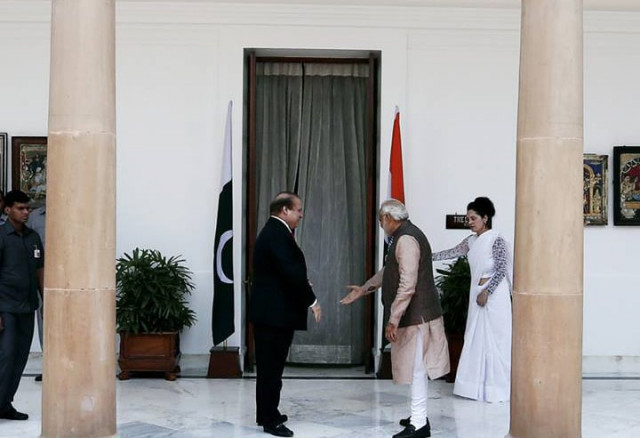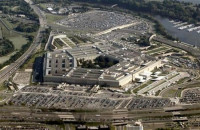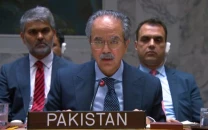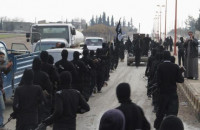A meeting in Delhi
No one should fault the PM for going an extra step forward for peace, and showing eagerness to improve relations.

Even if Sharif went a step further than Modi to move on from the past, Pakistan has shown its sincerity of purpose to India, the region and to the world. PHOTO: REUTERS
Closer analysis of the points of contention will help reveal the entire story. Firstly, the source of the supposed pressing on terrorist sanctuaries and Mumbai attacks is the Indian media, which, even by most conservative estimates, has historically taken a myopic and nationalistic stand on relations with Pakistan that are not always grounded in reality. Their source, in turn, was the Indian Foreign Office, which released a briefing on the meeting even before Prime Minister Sharif left India. One can argue that the Pakistani version of events was limited to a cosmetic press briefing by Prime Minister Sharif just before departing, and hence Pakistan’s actual version on what exactly transpired during the meeting was omitted from the immediate analysis of what happened.
In all fairness, Sharif’s briefing was never going to be too revealing and the detailed version was the job of the Foreign Office, which came a day later. You can blame the Indian state machinery for being too trigger happy with their own detailed version of the meeting given that Sharif hadn’t even left yet or the Pakistanis being too slow to respond and release their own version of events. But that is a largely superficial argument over semantics and not a material analysis of what the meeting means for India-Pakistan relations.
Pakistan’s version came on May 28 in the form of a press briefing by Adviser to the Prime Minister on Foreign Affairs Sartaj Aziz. In his talk, Aziz said that the Mumbai attack was indeed brought up not as a point of immediate contention but as one of many issues that were briefly touched upon and listed as issues that would come up moving forward. In the same vein, Pakistan did bring up Kashmir as well as the Samjhauta Express carnage. That’s fair enough. Aziz stressed that Modi was told that the law was taking its course regarding the investigations into the Mumbai attacks, and the adviser also added that no timeline was sought or given meaning the mentions were informal. Usually such meetings are followed by a joint communique of some sort to avoid such schisms in versions. That there was none was a procedural failure.
As for the meeting itself, there is plenty to take away even for the most jaundiced of eyes. The first major meeting held by the most powerful Indian prime minister in a generation on day one of his tenure was with Pakistan and that too by a man that many feared would take a very hard line on Pakistan, and a man that many still view through the prism of the Gujarat Muslim massacre. That’s significant. Even if Sharif went a step further than Modi to move on from the past, Pakistan has shown its sincerity of purpose to India, the region and to the world. No one should fault the prime minister for going an extra step forward for peace, and showing eagerness to improve relations, which is in everyone’s interest. That places the ball in Modi’s court on a matter that is as inescapable for a globally ambitious India as it is for a recovering Pakistan. One hopes the Modi Administration realises that. But these are all essentially still semiotics. Let us talk material progress. Both sides have agreed to officially restart dialogue after a period of hostilities. And that is progress by any standard.
Published in The Express Tribune, May 29th, 2014.
Like Opinion & Editorial on Facebook, follow @ETOpEd on Twitter to receive all updates on all our daily pieces.



















COMMENTS
Comments are moderated and generally will be posted if they are on-topic and not abusive.
For more information, please see our Comments FAQ